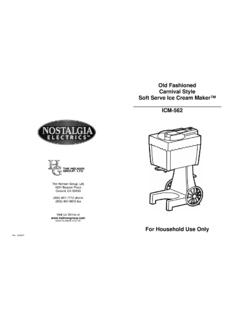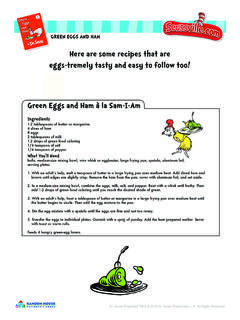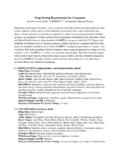Transcription of PickYourOwn
1 Where you can find a pick - your -own farm near you! Click on the printer icon that looks like this: (at the top left, to the right of save a copy ) to print! See for many other canning directions and recipes How to Make Fix a Batch of Runny Jam or Jelly! Sometimes after you have canned your jam, jelly or other preserves and let it cool, you open a jar, only to find it hasn't set properly an d is too runny! If your jam or jelly turns out too soft or runny, don't despair, and don't throw it away! It can be fixed! Here's how! If the jam is too thick, before you put it in the jars, just heat 1 or 2 cups of grape juice (or any other fruit juice of similar or neutral taste, like apple or white grape) to boiling. Then, gradually pour and stir it in until you reach the desired consistency, then continue canning!
2 If the jars are already sealed / canned, then when you use them, just stir in a little grape juice until you reach the desired thickness. If the jam turns out too runny, that is a little different to fix. Here's how: Or click here for a PDF version that prints nicely! If you want this page in metric units, click here! And Google has a great conversion calculator that will convert from any units to any units. Ingredients The jars of jam to be remade No- sugar-needed type pectin - available at most grocery stores and big box stores and online here, at right. If you use regular pectin, that may make the jam or jelly too sweet! 1 box of dry pectin is equal to oz (by weight, or 7 tablespoons, or almost 1/2 cup or 21 teaspoons). Lemon juice Sugar All images and text Copyright Benivia, LLC 2017 All rights reserved.
3 Page 2 of 6 Supplies New lids for the jars (you can reuse the rings and wash the jars.) Background It takes 3 ingredients for jams and jellies to set: pectin, sugar and acidity. The amount of pectin that is naturally occurring in the fruit varies from one type of fruit to another and by ripeness (counter intuitively, unripe contains more pectin). See this page for more about pectin in fruit. It takes the right balance, and sufficient amounts of each of pectin, sugar and acidity to result in a firm jam or jelly. And beyond the balance of those ingredients, there are two conditions that must be met: the right amount of heat for the right amount of time. It takes a brief period (1 minute) of a hard boil, to provide enough heat to bring the three together. Generally speaking, if your jam doesn't firm up, you were short in pectin, sugar or acidity or didn't get a hard boil.
4 We will correct that when we remake the jam or jelly! Finally, you CANNOT reliably make batches of jam larger than 6 cups of raw fruit (of course, but the time you add sweetener, lemon juice, etc. it will be more than that). No matter how much you stir, you won't get effective heat penetration in larger batches, so some pectin gets overcooked, while other pectin is not activated. So, to reliably fix the jam, you will need to split it into batches of less than 7 cups each. Step 1 - Empty the jars into a pot and clean the jars Empty the jars that are to be remade into a large pot (I like 16 qt) Then clean the jars and discard the used lids. your jars need to be clean and "sterile" - Sterile means put them into the boiling water bath when you fill the canner and then remove them right before you fill them.
5 That way the will be hot and sanitized. The lids should All images and text Copyright Benivia, LLC 2017 All rights reserved. Page 3 of 6 be kept in hot, steamy (but not boiling) water (around 180 to 200 F, or 80 - 90 C). Step 2 -Determine how much jam or jelly needs to be remade Measure the jam or jelly to be recooked. Work with no more than 4 to 6 cups at a time. Check all the jars from the batch - if one failed to set, most or all probably failed. You can check by just turning them upside down and seeing how quickly the jam or jelly shlooshes* around in the jar. (* - Schloosh - from the old Pennsylvania Dutch verb, "schlushen" meaning to flop around like a freshly caught trout) Add up the volumes of all the jars to be reworked, to figure out the size of the batch (in quarts) for step 2.
6 1 qt = 32 oz = 2 pints = four 8oz jars = eight 4oz jars). Open the jars to be fixed and dump them all into a large pot. Since you will probably want to reuse the jars, get the now emptied jars washing in the dishwasher. Step 3 - Measure out additional pectin, water, sugar and lemon juice If you are using powdered pectin: For each quart of jam or jelly to be fixed, mix cup sugar, cup water or white grape juice, 2 tablespoons bottled lemon juice, and 4 teaspoons powdered pectin in a large pot. So, if you made a batch of jam and have 10 eight-ounce jars that didn't set, that would be an average batch (10 cups or quarts). For that average batch of about All images and text Copyright Benivia, LLC 2017 All rights reserved. Page 4 of 6 quarts total, you would need 2/3 cups sugar, 2/3 cups water or juice and about 1/3 cup lemon juice, plus about 3/4 of a box of pectin, preferably the no-sugar variety.
7 This table may help you with calculations: Amount of jam or jelly to re-make sugar water or grape juice lemon juice pectin 2 cups (1pint) 4 teaspoons 4 teaspoons 1 tablespoon 2 teaspoons 3 cups 6 teaspoons 6 teaspoons tablespoons 3 teaspoons 4 cups (1 qt) 1/4 cup 1/4 cup 2 tablespoons 4 teaspoons 5 cups 1/4 cup 1/4 cup tablespoons 5 teaspoons 6 cups ( qt) 1/3 cup 1/3 cup 3 tablespoons 6 teaspoons 7 cups 1/3 cup 1/3 cup tablespoons 7 teaspoons 8 cups (2 qts) 1/2 cup 1/2 cup 4 tablespoons 8 teaspoons Remember, if you have more than 6 cups of jam, If you are using liquid pectin: For each quart of jam or jelly, measure cup sugar, 2 tablespoons bottled lemon juice, and 2 tablespoons liquid pectin in a large pot. Step 4 - Mix with the jam or jelly and bring to a boil Add the jam or jelly to the pectin mixture and bring it to a rolling boil again, over high heat, stirring constantly.
8 Keep in mind that one reason jams and jellies don't set is because people try to double batches, and there is non-uniform heating. That results in some pectin becoming over-cooked and some pectin in the batch is under cooked. Never make a new batch of jam or jelly starting with more than 6 cups of crushed fresh or frozen fruit; and never try to remake a batch larger than quarts. Once it is a rolling boil, boil hard for 45 to 60 seconds (1 minute). All images and text Copyright Benivia, LLC 2017 All rights reserved. Page 5 of 6 Step 5 - Testing for "gell" (thickness) I keep a metal tablespoon sitting in a glass of ice water, take it out, shake off the water and then take a half spoonful of the mix and let it cool to room temperature on the spoon. in a minute or so. If it thickens up to the consistency I like, then I know the jam is ready.
9 If not, I mix in a little more pectin (about 1/4 to 1/2 of another package) and bring it to a boil again for 1 minute. Step 6 - Remove, from heat, skim and fill the jars Remove from heat, and quickly skim the foam off jam or jelly. Fill sterile jars (automatic dishwashers often have a sanitize setting, otherwise, wash and dry and add 5 minutes to the processing time), leaving -inch headspace. Adjust new lids (don't reuse the previous lids, they are single use) Step 7 - Process in the water bath .. process as recommended in the table below. Recommended process time for Remade Soft Jellies in a boiling-water canner. Process Time at Altitudes of Jar Size* 0 - 1,000 ft 1,001 - 6,000 ft Above 6,000 ft Half-pints or pints 5 min 10 15 *Larger sizes are generally not recommended for jams and jellies All images and text Copyright Benivia, LLC 2017 All rights reserved.
10 Page 6 of 6 Lessons learned If the jam was too runny, then next time you might want to add about 20% more pectin to start with, or make sure you bring to a full hard boil for 1 minute (not less, and not more than a few seconds longer). If it was too thick, add a little less pectin, and/or a bit of fruit juice before you cook it! Limit your batch sizes to no more than 6 to 8 cups of crushed fruit to start - meaning each batch should produce no more than 8 to 11 jars (8 oz each) of jam or jelly. If you want to learn more about pectin, how it works and the different types of pectin, and where to get it; see this page. Can I use Instant freezer pectin to make cooked / canned jams and jellies? See this page for the answer!
















